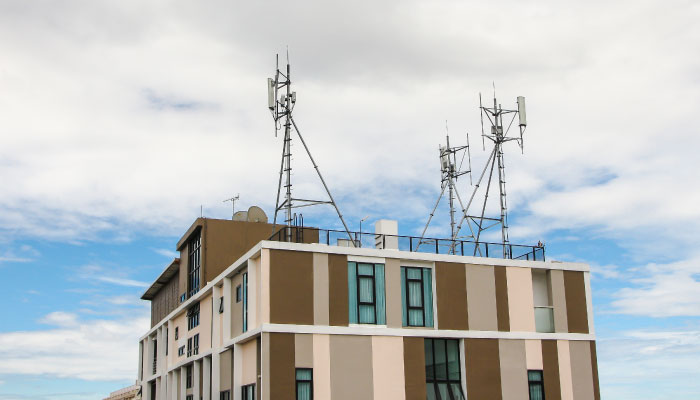If you own commercial property, you are likely focused on generating revenue from what’s right in front of you: your apartments, hotel rooms, or offices. But what about what’s above all of those: the roof? For many, rooftops are an untapped frontier of potential revenue, much of it passive.
Rooftop marketing and management expert Michael D. Bickford explains the secrets of rooftop leasing in a live webinar for AudioSolutionz, “Rooftop Revenue Opportunities: Learn to Rent Your Roof for Antennas and More.” He outlines the nuts and bolts of rooftop leasing, who some potential tenants might be, and helps you estimate how much money might be in it for you.
Consider Becoming a ‘Microcell’
Rooftop revenue opportunities abound, but your options depend on a number of factors—from local land use restrictions to the physical size of your space. Still, small isn’t necessarily bad.
Cellular network providers are constantly hunting out new opportunities to increase coverage, making rooftop cell tower leasing a major goal of many building owners. Cell companies have traditionally favored what they call “macrocells”—large towers that serve large areas. But, when it comes to data services, a variety of small facilities are actually better at delivering gigs.
Those small towers include microcells, picocells, and femtocells, explained Steel In The Air, a cell tower leasing facilitator.
“Small cells reduce the overall cost of serving dense metropolitan areas and provide a means to support new services that can increase revenues from business users,” tech company Nokia noted in a blog. “In the longer term, CSPs (cell service providers) can use small cell networks to enhance network quality for the business market and create more loyal customers.”
Save With Solar Panels
Cell siting does often depend on a number of factors out of your control. Solar panels, on the other hand, are less situationally-dependent. The revenue opportunities are lower than for cell towers, but you can count on cost savings, too. For instance, in most cases, you would own the panel system yourself and cut or eliminate your electricity bills while possibly selling electricity to the grid.
Solar system costs vary widely between states depending on local economies and incentives, but in 2018 the average cost of a rooftop solar system in the U.S. was $18,840 before tax credits. Credits brought the average price of a 5000 watt system down by as much as half, found Energy Sage.
How large of a system you need hinges on a number of factors, explained Solar Power Rocks, but 5000 watts is the size of an average single-family home system in the U.S. (Wondering if your roof is better than your neighbor’s when it comes to rooftop solar systems? Check out this cool map from Google.)
Before You Begin: Check Your Local Ordinances
While the market is rich with opportunities, rooftop antennas revenue can vary widely, warned Steel In The Air. In 2016, average lease rates were $1,300 per month across the entire country, but getting near that was heavily dependent on location. The average tower fetched just $1,000 in Houston but more than double that in Oakland. The chief revenue factor is the availability of alternative options, but beyond that, knowing what to ask for is much of the battle.
Key: “Landowner knowledge of lack thereof is the second-highest influence of higher cell tower rental rates,” the site said.
But no money will be coming in if your local jurisdiction doesn’t allow cell tower siting in the first place—or has restrictions in place that preclude your site from consideration.
“The zoning process for the construction of new cellular telecommunications towers is highly controversial and often times cell tower companies find themselves fighting an uphill battle against a municipality and local residents to obtain the necessary zoning approvals,” cautioned industry attorney Levin V. Czubaroff in an article titled “Cell Tower Companies Face a Heavy Burden of Proof to Succeed in a Validity Challenge to a Zoning Ordinance.” Nationwide there are running battles between wireless carries and municipalities, and even small cell mini towers can raise the ire of locals.
Bickford maintains that there are secrets to rooftop leasing to be unlocked—knowing which ones to pursue is the best way to start.




